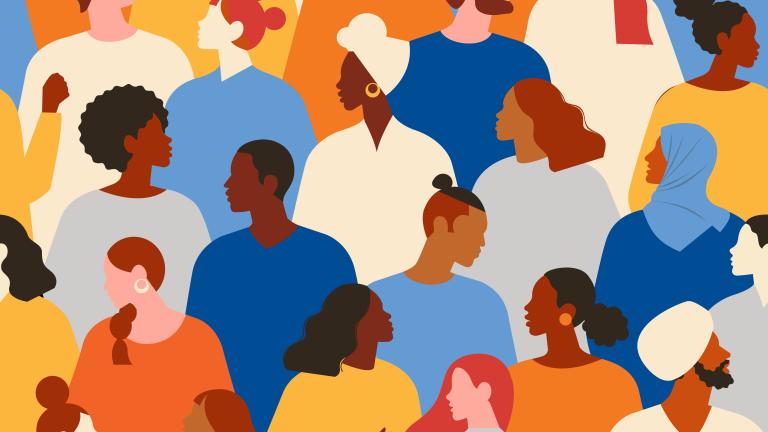Combating Human Trafficking Through the United Way Network

Human trafficking occurs when someone is compelled to work or engage in commercial sex through force, fraud, or coercion by a third-party exploiter, or when a minor is involved in commercial sex. Certain populations face an elevated risk of human trafficking due to systemic barriers, including economic and racial inequity. Human trafficking does not require movement – it can happen to someone in their own community or home. It is a pressing issue found in every industry across the United States and around the world, affecting over 50 million people worldwide.
While the magnitude of this issue can feel overwhelming, United Way has found that by improving access to health, education, and economic mobility, we are empowering community members and tackling issues like poverty and homelessness that increase vulnerability to human trafficking. By leveraging our unique and longstanding position as a trusted community stakeholder, we have the power to stop human trafficking before it starts and support survivors to heal and thrive.
Drawing on existing expertise, programs, and local connections, United Way of Greater Atlanta, Metro United Way in Louisville, United Way of Southern Nevada, and United Way of Southern Cameron County have all demonstrated the power of United Way to combat human trafficking.
United Against Human Trafficking
United Way of Greater Atlanta (UWGA) noticed a significant overlap in their community among unhoused women and girls and sex trafficking survivorship. To improve support services for this vulnerable population, UWGA collaborated with local service providers to launch the Case Management Training Academy (CMTA), which provides training for direct service providers to improve identification and services for survivors. By integrating their efforts to combat housing insecurity and human trafficking, UWGA collaborated with local partners to provide safe and culturally competent housing assistance to survivors in the community. UWGA also used their grant funding to provide direct cash assistance to survivors, contributing to their financial and housing stability. Hailey, a trafficking survivor, was a part of the transitional housing program at UWGA’s partner agency, House of Cherith, when she joined UWGA’s direct cash transfer program. Through this program, Hailey was able to save enough money to move into her own apartment last year!
United Way of Southern Nevada (UWSN) has focused its anti-trafficking efforts on coalition building to advocate for improved policies and legislation in their state. The UWSN team helps lead a Policy Council of survivor and ally community leaders in the Las Vegas area to achieve shared priorities. The group has successfully advocated for new policies and state legislation supporting anti-trafficking education, victim and survivor human rights and services, and decreasing the demand for commercial sexual exploitation. To date, eight bills related to human trafficking have been passed due to the work of the Policy Council.
Metro United Way (MUW) of Louisville, Kentucky convened a steering committee of colleagues with lived experience, and stakeholders from child welfare, legal services, government, and social service in the local anti-trafficking ecosystem. The group conducted research on existing programs for survivors and those at risk in the Louisville Metro Area before publishing a Landscape Analysis and inviting additional community members into the conversation. Equipped with new insights into existing programs and needs, MUW established the United Community Referral Program and distributed micro-grant funding to fill the gaps in services in the community.
In their rural Texas community, United Way of Southern Cameron County has facilitated caseworker trainings, improved social service programming, provided emergency shelter for survivors, and spearheaded awareness-raising campaigns to ensure at-risk agricultural workers know their rights. UWSCC has also collaborated with legal and law enforcement agencies to support the procurement of special visas for trafficking survivors and worked with the Mexican Consulate to reunite some survivors with their families back home. One such survivor is Claudia, who received support services after disclosing her trafficking situation to hospital staff, where she was connected with Refugee Services of Texas, a UWSCC partner. After giving birth, Claudia received emergency housing, medical care, therapy, and financial literacy education, as well as immigration and legal support when she filed a case against her traffickers through Homeland Security.
Each of these United Ways has considered the unique needs and vulnerabilities present in their own communities. Whether it’s addressing the barriers faced by unhoused women and girls in Atlanta; meeting medical and legal needs of migrant workers in Texas; building a survivor-centered legislative landscape in Nevada; or galvanizing community engagement through research in Louisville – these United Ways have drawn on their own strengths and community needs to combat human trafficking.
Like these four United Ways, other US-based United Ways can integrate anti-trafficking efforts into existing work, and our teams at United Way Worldwide have created an exciting new tool to help. United Way Worldwide has created an exciting new tool to help. The Strategy Guide to Combat Human Trafficking is a comprehensive resource that local United Ways can utilize to understand and address the issue of human trafficking in their communities. It aims to empower United Ways across the United States to combat this issue by leveraging existing strengths, partnerships, and programs.